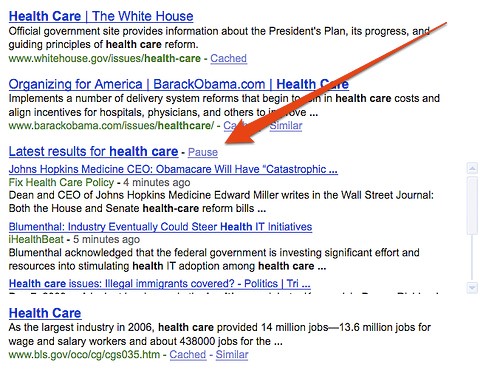Twitter Firehose is Open to Google… Again!
Executive Summary:
- On February 5th 2015 Google and Twitter announced a renewed partnership enabling Google to utilize Twitter data.
- This is one of the biggest indicators that Google is serious about Real-Time search.
- More volatility is expected within search results as it begins reflecting the real world more correctly.
- Companies will be forced to interact through real-time social media such as Twitter.
- For companies whose search was fairly stable, this presents new risks.
- For companies willing to engage, this presents new opportunities.
- Companies need to claim ownership and begin minimum activity on Twitter to establish a presence.
Why is it Called “The Firehose”?
The recent partnership between Twitter and Google provides API access – what is commonly referred to as “access to the Twitter Firehose” – to Google. This is an attempt to bring more real-time data into the search giant, providing a seamless and timelier experience for the user.
When Google crawls a site, it “visits” each and every page, ordinarily requiring minimal effort. However, when this happens too often, the site’s servers become over-burdened. For example, if Google were to crawl Twitter’s 6,000 tweets a second and nearly 500 million tweets a day, Twitter would crash.
At this point, studies show that only 7% of all tweets get indexed within Google. The Firehose is a real-time feed designed to allow Google to absorb the vast quantity of data using an API.
History of the Relationship
This is not the first time we have seen this relationship between Google and Twitter.
- In October 2009, Google signed a deal with Twitter to utilize the data from the “firehose.”
- Two months later, Google revealed its “Real Time Search,” with another information box consolidating tweets into the organic results.
- After less than two years, in July 2011, Google and Twitter were unable to renew the terms of the deal. They parted ways and Google stopped showing real-time search as a result. At one point, among friction, Twitter entirely blocked Google’s bots from crawling the site, later explaining it was a mistake and unintentional.

The Real-Time Web is Growing as the Firehose Opens
In a world of fast moving technology, real-time data has become more important than ever, escalating the expectation of the average user.
- Google does an incredible job at indexing global data, but there is often a delay in how quickly it can unearth the latest news.
- Twitter on the other hand – better than any other platform – often breaks stories and is the source of real-time news consumption. Aside from that, Twitter could generally go unnoticed once mainstream media catches up.
What has become clear is that both platforms alone do not tell the full story online. With this alliance, users will get real time updates into the most comprehensive source of information substantially increasing retrieval time.
Five Blocks’ Predictions
While it is still unclear how the relationship will ultimately materialize, there is some speculation based on some of the previous history:
Prediction 1
Google will NOT create a custom section in the results page for Tweets as they did last time. That being said, this doesn’t make it any less important, and could add a new layer of complexity and turbulence to search results.
Prediction 2
Hashtag result pages will become very influential. In November 2014, Twitter began building out more “SEO friendly” pages for their hashtags. Google will find a way to leverage this rich, timely, and trending content.
Prediction 3
Google will begin incorporating social metrics into search results, similar to the way Schema markup will work. Bing has recently rolled this out which indicates authority.
Preparing for all Eventualities
For brands willing to engage on social media, there is a tremendous opportunity to gain additional control during a real-time crisis situation.
While there are no certainties on the exact execution of this relationship, the need to be prepared is indisputable. When Google “flips the switch,” it will likely cause many immediate changes to search results, especially if timely information is being shared.
In order to be prepared, we recommend:
- Claim your Twitter handle – If you already own your brand’s name, great! If not, this could mean taking over an account that is currently owned by someone else.
- Optimize Images and Descriptions – Add your logo, include a nice description, background image and appropriate link back to the company website.
- Verify the account – In this process, brands and prominent individuals register with Twitter, authenticating their Twitter account ownership.
- Start Tweeting – Begin investing small amounts of time in Twitter and – at a minimum – automating tweets which include company news, press releases, statements, or other positive relatable content.
- Create an emergency response plan for when news begins to trend.
Conclusion
Time will tell how this relationship will evolve, but the most important thing is to have all assets in place. This is likely the beginning of Google integrating real-time content into search results and we can expect to see more social impact, markup, and social media as ranking signals and measure of influence.
For more information on Twitter and Google partnership, visit the resources below:
- Launch Announcement:
http://www.bloomberg.com/news/articles/2015-02-05/twitter-said-to-reach-deal-for-tweets-in-google-search-results - FAQ with Danny Sullivan:
http://marketingland.com/twitter-google-search-deal-faq-117463 - Google Index Study:
https://blogs.perficient.com/2015/02/10/how-does-google-index-tweets-today-how-the-new-twitter-deal-will-impact-seo/
For more information about Five Blocks, visit us at https://www.fiveblocks.com or contact Aaron Friedman at aaronf@fiveblocks.com or 847-877-85174 with any inquiries how we can help.

